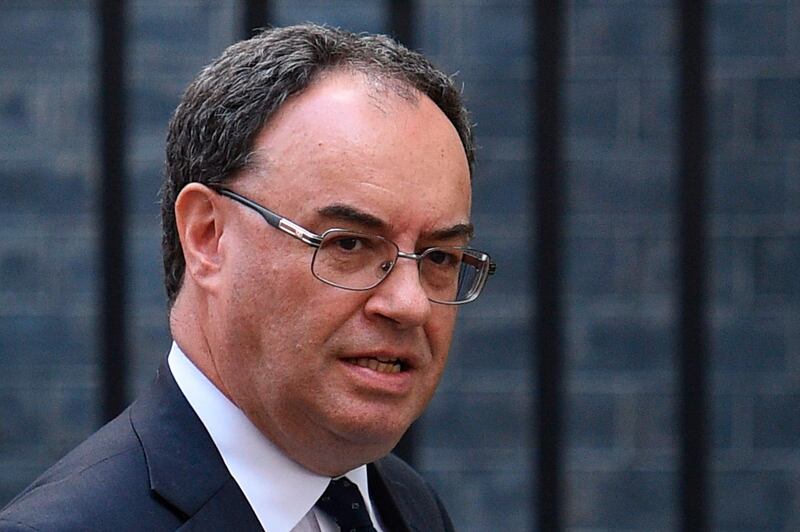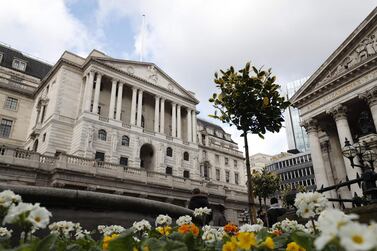Experienced city regulator Andrew Bailey has been chosen to succeed Mark Carney as Bank of England governor.
Mr Bailey was “the standout candidate in a competitive field,” Chancellor of the Exchequer Sajid Javid said.
“Without question, he’s the right person to lead the bank as we forge a new future outside the EU.”
Mr Javid praised Mr Bailey's role during the 2008 financial crisis, when he was head of the BoE's team responding to the collapse of British banks.
“He is the right person for the job not just for the next few years but for the long-term strength of the economy," the chancellor said.
“It is critical that the governor and indeed everyone working with the governor in the Bank of England is independently minded,” he added.
"The institution should make “whatever decisions that it feels necessary without any interference whatsoever from any government, any politician or any other body.”
The appointment comes despite recent speculation that Minouche Shafik, a former deputy governor, would get the job.
She would have been the first woman to lead the central bank in its 325-year history, and Mr Javid’s choice opens the government up to criticism that it’s failing to address gender diversity at the BoE.
Other names that were shortlisted for the role included Santander chair Shriti Vadera and former member of the US Federal Reserve’s board of governors, Kevin Warsh.
Mr Bailey, 60, once worked as the central bank’s chief cashier, whose signature appears on banknotes.
He is respected among civil servants and seen as a safe choice for the role.
“The Bank has a very important job and, as governor, I will continue the work that Mark Carney has done to ensure that it has the public interest at the heart of everything it does,” he said in a statement. “It is important to me that the Bank continues to work for the public by maintaining monetary and financial stability and ensuring that financial institutions are safe and sound," Mr Bailey said.
He had been head of the Financial Conduct Authority (FCA), charged with ensuring that financial markets operate fairly.
He was named just a day after the FCA was asked by the BoE to investigate the “misuse” of the audio broadcast of some of the central bank’s press conferences that might have given traders an unfair advantage.
Mr Bailey will start after March 15, with Mr Carney extending his term for a third time until then.
The UK is set to leave the EU on January 31.
Former Chancellor Philip Hammond said he had searched internationally for Mr Carney’s successor, but candidates such as previous governor of the Reserve Bank of India Raghuram Rajan have suggested that the wrangling over Brexit discouraged them from seeking the role.
“Mr Bailey of the is the most able and competent BoE officials I have worked with: by far the steadiest under fire in the financial crisis,” Nick Macpherson, the former head of the UK Treasury said on Twitter on Friday.
“He won’t make waves unnecessarily. But his all-round experience will help to steady economic policy at a challenging time.”
Stephen Jones, chief executive of UK Finance congratulated Mr Bailey on his appointment on Friday.
"Mr Bailey is widely respected, highly experienced and has demonstrated significant expertise in financial services regulation at both the Bank and FCA," he said.
“This makes him ideally placed to oversee financial stability and monetary policy through a potentially challenging time for the UK economy when he takes over as Bank of England governor."
For all his experience at the BoE, Mr Bailey was never part of the central bank’s interest-rate setting committee, meaning his views on monetary policy are largely unknown.
The BoE has often been in limbo since the 2016 Brexit referendum. Uncertainty on the UK’s future relationship with the EU led Mr Carney and his colleagues to keep their benchmark interest rate mainly unchanged, cutting once and hiking twice since the vote.
Now, two of the nine-member Monetary Policy Committee are currently calling for a rate reduction, and some banks expect a cut to be delivered in 2020.
Mr Bailey joined the banking regulator in 2016, when he was lauded by former Chancellor George Osborne as “simply the most respected, most experienced and most qualified person in the world” for the role.
That followed a distinguished career at the BoE, where he held roles including deputy governor, CEO of the Prudential Regulatory Authority and private secretary to BoE head Eddie George - a role that is seen a launchpad for leaders.
Before that he studied at the University of Cambridge where he received a degree in history and a PhD in economic history.
Mr Bailey is highly regarded for his work a decade ago on Northern Rock, the bailed-out mortgage lender that experienced the first run on a British bank in more than a century.
But more recently, a series of scandals at the FCA have put Mr Bailey's work under scrutiny. These include the controversial restructuring of the Royal Bank of Scotland, where the regulator said it wouldn't punish the bank for mistreating business customers after the 2007 recession.
The watchdog has also been accused of overlooking fund manager Neil Woodford's flagship fund after the fund manager blocked investors from withdrawing money. The fund was later suspended and resulted in investors losing huge sums of money.
The FCA's recent handling of Wonga and QuickQuid has also drawn attention, with some critics saying that the watchdog should have spotted the collapse of the payday lenders earlier.
The pound was up against the dollar on Friday morning following the announcement, at 1.3039 compared with 1.3007 at 11pm GMT on Thursday.







